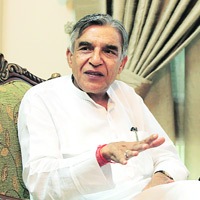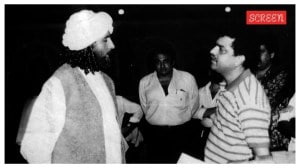Stay updated with the latest - Click here to follow us on Instagram
‘Students used to contest polls without affiliation to any party’
Bansal, who is former MP from Chandigarh, says that during his student days, there was no political party on the campus and later only two parties, including NSUI, had emerged.
 Members of NSUI at Panjab University on Sunday. Sumit Malhotra
Members of NSUI at Panjab University on Sunday. Sumit Malhotra
Panjab University alumni who are active in politics now give their take on the PUCSC elections in conversation with Ifrah Mufti and Meghna Malik
Pawan Bansal, former Union Railways Minister
Former Union Railways Minister Pawan Bansal believes that the student politics at Panjab University has undergone a drastic change from the time when he was an active member of the students’ council and was general secretary in 1971.
Bansal, who is former MP from Chandigarh, says that during his student days, there was no political party on the campus and later only two parties, including NSUI, had emerged.
“Students used to contest the election themselves without affiliation to any political party. The second good thing about election during those days was that there used to be no presidential candidate. There were only posts for vice-president and secretary.
Thirdly, we had indirect election those days. The Dean Students Welfare was our president and we used to work under his leadership,” he adds.
“However, the worst part about the elections those days was that the election was only confined to very few people. Around 45 students used to be eligible voters and they used to get easily kidnapped for as long as 10 days. Also, the level of violence at that time was much higher,” he says.
Satya Pal Jain, former member of Parliament
Additional Solicitor General of India in the Punjab and Haryana High Court and a former member of Parliament, senior BJP leader Satya Pal Jain was a student of Political Science at Panjab University in 1973. Through indirect elections, he was elected as general secretary of the PU Students’ Council in 1974. “The department used to elect Department Representatives, who would in turn elect the office-bearers. But I moved a resolution that direct elections should be held, and after the Emergency in 1975, direct elections were started in 1977,” he says.
Jain, however, feels that even though a democratic system of electing office-bearers has now been put in place, students have started limiting themselves to local issues only. “Earlier, national and social issues like unemployment, the Jai Prakash movement and other movement of social change were dominant. But now, despite being backed by national political parties, national issues are not being addressed by the students. I believe the students should work towards nation-building as well.”
Harmohan Dhawan, former Union Minister
A student at the Department of Botany at Panjab University in 1960, former Union Minister and senior BJP leader Harmohan Dhawan believes the mechanism of Students’ Council elections has come a long way since then.
“Back in my time, there were no student organisations. Even the elections were not held the way they are held now. Each department had its own classroom representatives, and out of these representatives, one representative used to be chosen internally,” he says. “Back then, any issues that were raised by the students used to be handled by their department representatives only.”
Appreciating the democratic way in which student elections are held now, Dhawan says national political parties having their own student wings is a positive thing for the students. “When student organisations are backed by national political parties, the students get to learn a lot about politicking, and are prepared to enter into the political arena as members of Parliament some day,” he adds.
Kuljeet Singh Nagra, Congress MLA
Now a Congress MLA in Punjab, Kuljeet Singh Nagra was the face of the Panjab University Students’ Union (PUSU) during the post-Emergency period, when elections were revived in 1988 till 1996.
Comparing the election scenarios during his time and now, he says there is more political interference in student politics now. “In our times, leadership was with the students as we never allowed the political party to head us,” he adds.
He says an example of major political interference on the campus is the emergence of the Students’ Organisation of India (SOI). “People from all over the world are against the Badals and Majithia because of the drug rackets being run in the state. Still, the party’s youth wing has emerged with a lot of influence among students. Here’s the big question today: is this political interference in the student politics good for students or not?”
Nagra says the student politics now is not only confined to the welfare of students on the campus, but the students are also getting involved in active politics by taking help from the state parties.











